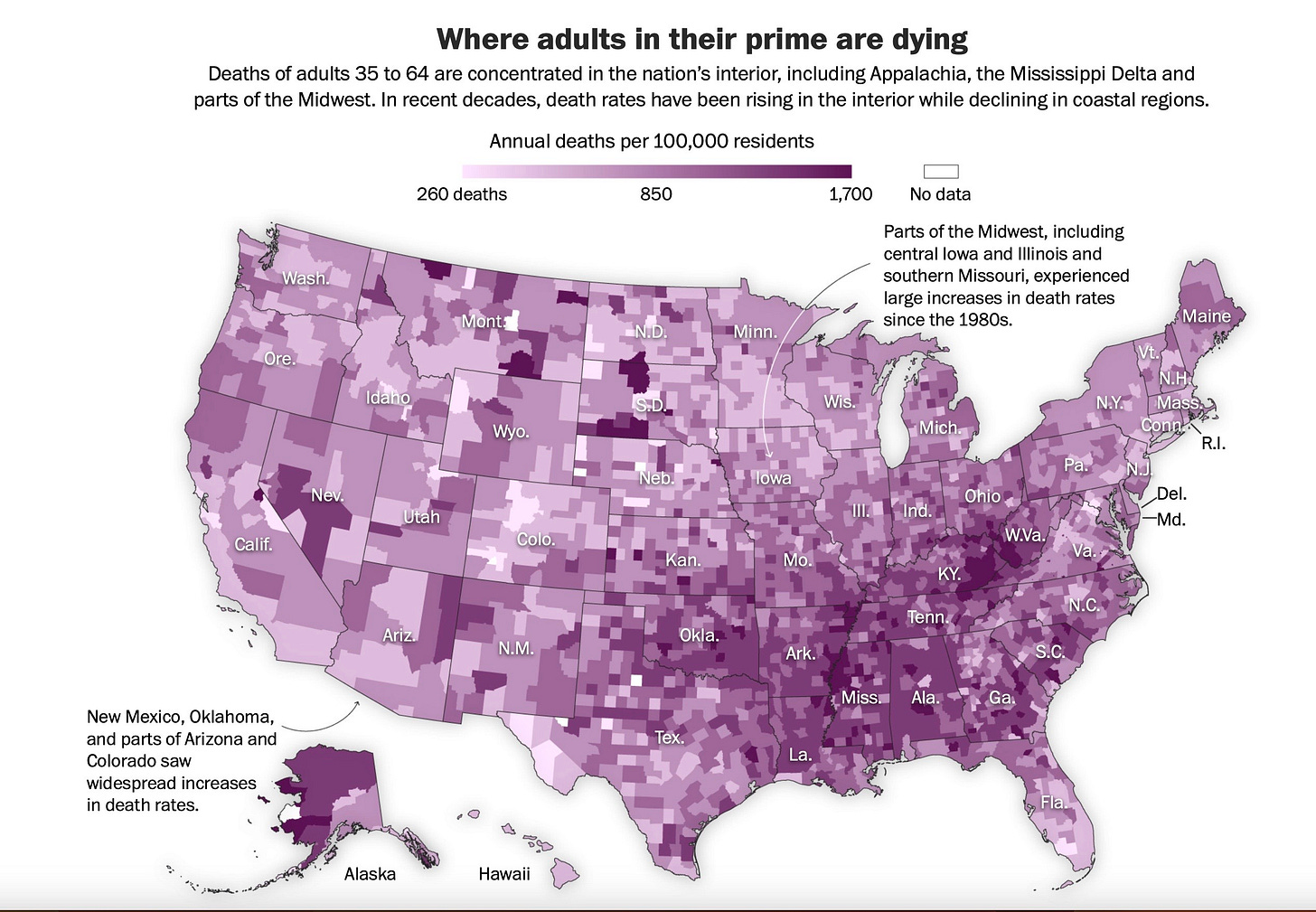Death Inequality: Sickness and Rebellion in the American Apocalypse
Neoliberalism and mortality -- a tale of two headlines.
From The Economist, September 28, 2023:
Living to 120 is becoming an imaginable prospect
From the Washington Post, October 3, 2023:
An epidemic of chronic illness is killing Americans in their prime
When it comes to social insurance, the Washington Post is hardly a leftist publication. Its editorial page routinely inveighs against Social Security and Medicare “entitlements.” That makes the lede to its October 3rd story even more striking. It begins, “The United States is failing at a fundamental mission — keeping people alive.”
At roughly the same time, The Economist tells us that “after years of false starts, the idea of a genuine elixir of longevity is taking wing. Behind it is a coterie of fascinated and ambitious scientists and enthusiastic and self-interested billionaires.”
The neoliberalist house organ notes that “some people, observing billionaires’ interest in longevity-promoting startups, worry that the benefits will be captured mainly by the rich, leading to a class of long-lived Übermenschen lording it over short-lived ordinary folk.”
Stuff and nonsense, scoffs the British mag. It reassures us that “technologies have a record of spreading, and cheapening as they do so.” That will come as news to poor people of the United States, whose lives are growing shorter and shorter.
Live to 120? There are counties in the United States where you’re beating the odds if you make it past 70. The majorities in these counties may be White, Black, or Native American. But each suffers from poverty, a shortage of healthcare options, and a needlessly complex insurance system. while racism, ageism, and regional animosities compound the mortality crisis.
The system’s complexity is largely an artifact of for-profit insurance, for-profit pharmaceuticals and, increasingly, for-profit medical offices. The Post tells us of one chronic-disease sufferer:
After he stopped working about seven years ago, he briefly qualified for Medicaid. But then he began collecting Social Security at 62, and his income exceeded the Medicaid eligibility limit. Next, he moved to an Affordable Care Act plan. Bouncing from plan to plan, he negotiated the complexities of being in-network or out-of-network ...
This is neoliberalism in a nutshell.
The Economist assures us that longevity science will be democratically applied: “It is hard to imagine a privilege more likely to spark rebellion than a ruling class that hoards age-treatments to escape the great leveller.” But the age-extending treatments we have today – for cardiovascular disease, for asthma, for cancer – are already being hoarded, albeit in less obvious ways. That’s why the once-small death gap between poor and wealthier regions has grown so dramatically. As the Post writes:
Sickness and death are scarring entire communities in much of the country. The geographical footprint of early death is vast: In a quarter of the nation’s counties, mostly in the South and Midwest, working-age people are dying at a higher rate than 40 years ago.
The rebellion is overdue.
Or is it? Look at the counties that are hardest hit by the mortality crisis:
The purplest counties on the map correspond pretty closely to support for Donald Trump and the far right. That may not have been the rebellion The Economist was talking about, but it’s a rebellion all the same.
The Post writes:
Forty years ago, small towns and rural regions were healthier for adults in the prime of life. The reverse is now true. Urban death rates have declined sharply, while rates outside the country’s largest metro areas flattened and then rose. Just before the pandemic, adults 35 to 64 in the most rural areas were 45 percent more likely to die each year than people in the largest urban centers.
The American left should take note, both for the greater good and for its own political future. The Electoral College and the Senate, both artifacts of slavery, give disproportionate political power to voters in the very areas hit hardest by death inequality. Yes, Democrats took some steps to address the crisis, but the fact remains: it kept getting worse during the Clinton and Obama years.
Bold action is needed to save lives – not “bold” as in “here’s something complicated and incremental that may help you in 2026,” but “bold” as in Medicare for All. It’s not enough to take a victory lap for past accomplishments, because those accomplishments haven’t stopped the dying. You can’t save the marginalized by tinkering around the margins.
What was the line that Ted Sorenson or someone wrote for John F. Kennedy? Oh, right: “Those who make peaceful evolution impossible make violent revolution inevitable.”
We’ve been warned.




The actual causes of the health stratification we observe are a spectrum of circumstances people find themselves in. If you are born (for example) into a Fox News household amid relatives and friends who share that primary exposure AND you don't leave home and get exposed to critical thinking, you have a good chance of over-exposure to processed food, guns, religiosity, conservative opinions, and a weakness for candidates who claim to have all the answers and the power to correct them. These cultural connections generally do not lead to good health -- because of their narrowness.